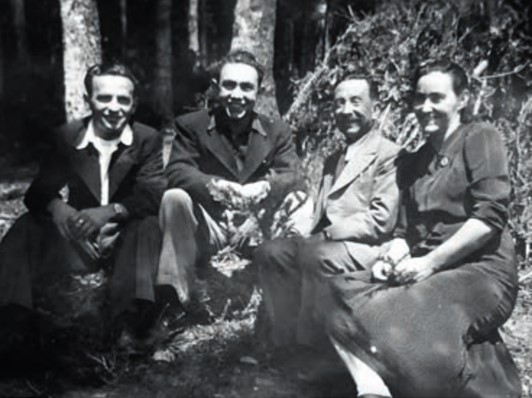Florencio Cascarosa Pirla and Florencio Cascarosa Perez
- Place of Birth: Belver de Cinca (Aragon), Spain
- Date of Deportation: 22 February 1942
- Address when Deported: Brest U-boat base
- Place of deportation: Alderney
- Sites deported to: Norderney,
By Antonio Muñoz Sánchez
Florencio Cascarosa Pirla was born in Belver de Cinca (Aragon) on September 1922. At the age of sixteen he crossed the Pyrenees on his way into exile together with his younger brother Antonio, his mother Carmen and his father Florencio Cascarosa Perez, born 1888, a peasant who had fought Franco in the Spanish Civil War. After a few days together in the refugee camp of Argelès, Carmen and Antonio were sent alone with other women and their children to Normandy. Following the outbreak of World War II, most of the half million refugees returned to Spain. The Cascarosa family, which was in contact by mail, decided to stay in France.
Florencio Sr. left Argelès to work on a farm in the South, while Florencio Jr. managed to join his mother and brother in the North. During the German offensive in Spring 1940 Carmen and her sons fled to the Midi like millions of French people and joined Florencio Sr. In October 1940, the Vichy regime sent the whole family once again to Argelès and later to Rivesaltes, now internment camps for “unwanted foreigners”. Despite his age (53), in June 1941 Florencio Sr. was handed over along with a large group of Spaniards to the occupation authorities as workers. Unwilling to leave his father, Florencio junior enrolled voluntarily. The Spaniards were sent to Brest to work in the construction of the submarine base. Carmen and Antonio remained in Rivesaltes and lived together with gypsies and Jews, who were later deported to Germany.
Florencio sr. and Florencio jr. were in the first transport of Spanish forced labourers to Alderney that arrived from Brest on 22 February 1942. Of his half-year on the island, Florencio jr. would later write: “There were Jews, Russians, Ukrainians and other nationalities. We had to work in the quarry. The work was terribly hard. We were fed basically with an impossible soup. The SS [sic] hit me when I could no longer work because I was exhausted. Many prisoners were shot dead for disobedience.” On 18 August 1942 a group of Spaniards was transferred to Guernsey, where they worked, so Florencio recorded, in equally appalling conditions.
In November 1943, father and son were taken to St. Malo and built batteries of the Atlantic Wall. Taking advantage of the chaos caused by an Allied bombing raid, they escaped. Over some days they walked only at night to get out of the heavily guarded coastal area and, with the help of French peasants and railwaymen, they managed to reach Chambon-sur-Lignon, a village South of Lyon, at Christmas 1943. The local population protected Jews and resistance fighters, and Mercedes and Antonio, who had also found a safe place after leaving Rivesaltes.
The family Cascarosa-Pirla permanently settled in France after the war. In 1957, Florencio jr. was one of the first Spanish forced workers of the Organisation Todt to claim for compensation from West Germany for his internment and the physical and psychological impact of his two and a half years in Brest, the Channel Islands and Cherbourg. After many years of legal fighting he got compensation, together with another thousand ‘Red Spaniards’. Florencio married and had a family in Paris. His brother Antonio still lives there.
Sources:
- Autobiographic account of Antonio Cascarosa in the exhibition “La sangre no es agua”, of Pierre Gonnord, org. by the Spanish Ministry of Justice, 2019. https://www.mjusticia.gob.es/es/AreaTematica/DocumentacionPublicaciones/InstListDownload/La_sangre_no_es_agua._Pierre_Gonnord.PDF (see family foto p. 15).
- Personal file of Florencio Cascarosa, Federal Service of Indemnization to the Victims of the Nazi Regime, Düsseldorf.
Map
- Cemetery / Mass Grave
- Concentration Camp
- Forced Labour Camp
- Prison
- Worksite / Fortification
